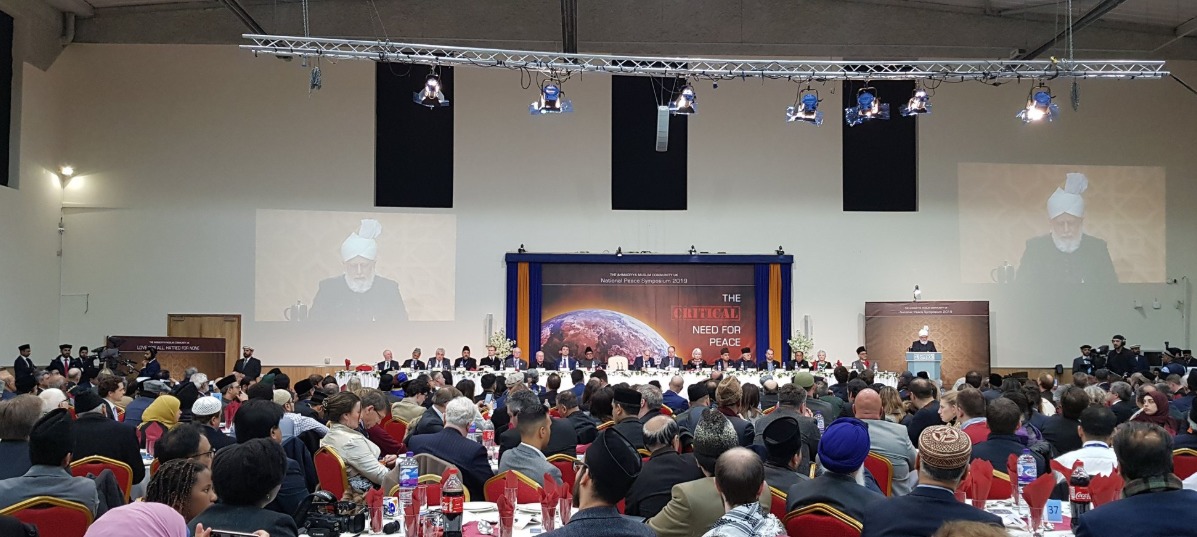Ahmadiyya leader warns of nuclear war in keynote address to hundreds of delegates


His Holiness Hazrat Mirza Masroor Ahmad, the Caliph of Ahmadiyya Muslims around the world, highlighted the proliferation of nuclear weapons and the dangers posed by climate change and extremism as key threats to peace globally during his keynote address.
Over 800 hundred delegates from 30 countries attended the event, which was held at the Baitul Futuh Mosque in Morden, South West London, to listen to the Caliph speak.
The Surrey Comet was invited to the Symposium as a guest of the Ahmadiyya Muslim Community UK (AMA UK), and asked Hazrat Mirza Masroor Ahmad what he considered the most serious threats to peace in the UK and around the world.
The Caliph hinted at the content of his keynote address, where he focused on the renewed threat of nuclear war.
Hazrat Mirza Masroor Ahmad said: “The leaders of some of the nuclear powers are trigger happy and appear not to appreciate the truly grave consequences of nuclear warfare.
“Not only do such weapons have the power to annihilate the countries targeted, but also have the potential to destroy the peace and stability of the entire world.
“Thus it is imperative that nations and their leaders not only focus on their own national interests but consider what is best for the world at large. Dialogue with other nations and communities is vital.”
The Caliph cited several geopolitical situations involving nuclear powers as a reference for the point, including the rising tensions between India and Pakistan over the disputed Kashmir region and the withdrawal of the United States and Russia from the 1987 Intermediate-Range Nuclear Forces Treaty (INF), a key nuclear arms control treaty signed by the US and Soviet Union during the Cold War.
During his keynote address Hazrat Mirza Masroor Ahmad also indicated his concerns over climate change and the rise of extremism in the wake of the refugee crisis.
The solution, he said, was to promote peace in those parts of the world refugees are forced to flee.
Hazrat Mirza Masroor Ahmad said: “The long-term solution to the immigration crisis has to be to establish peace in war-torn countries and to help the local people, who have been forced to endure lives of misery and danger, to live peacefully.”
“The Islamic viewpoint is that peace can best be achieved through unity. Yet, regretfully, instead of uniting, we are seeking separation and prioritising our individual interests over the collective interests of the world.”
A member of the Ahmadiyya Muslim Community UK, Fahran Khalid, escorted the Comet on a short tour of the mosque ahead of the symposium itself, where the paper was invited to attend a prayer ceremony led by the Caliph himself (pictured).
Scores of the faithful prayed in synchronization under the mosque’s great domed roof, while Hazrat Mirza Masroor Ahmad’s voice gently cut the near-silence as he read selected passages from the Quran.As Saturday’s proceedings came to a close Mr Khalid reflected on the event.
Mr Khalid said: “The event was a great success today…we have 30 countries represented here, we can see the
At the mosque Mr Khalid informed the Comet about the history of the Ahmadiyya community and their ongoing persecution in some countries — the UN’s Special Rapporteur on freedom of religion or belief, Ahmed Shaheed, has condemned both India and Pakistan for their treatment of Ahmadiyya Muslims recently.
He also described the rapid growth of the community worldwide since its foundation in India, 1889, by Mirzā Ghulām Ahmad, whom Ahmadi Muslims consider to be the messiah.
AMA UK themselves are taking direct action when it comes to peace promotion, and have cited climate change as a key concern — as the Comet reported earlier this year, the group successfully planted 10,000 new trees near Epsom in a single day in January.
se politicians from various walks of life, politicians and mayors, councillors and other leaders, and we’re all here to discuss peace and the situation the world finds itself in.”
“As his holiness said, we need to stop and reflect on how we can establish peace, and we’ve had some great conversations.”

